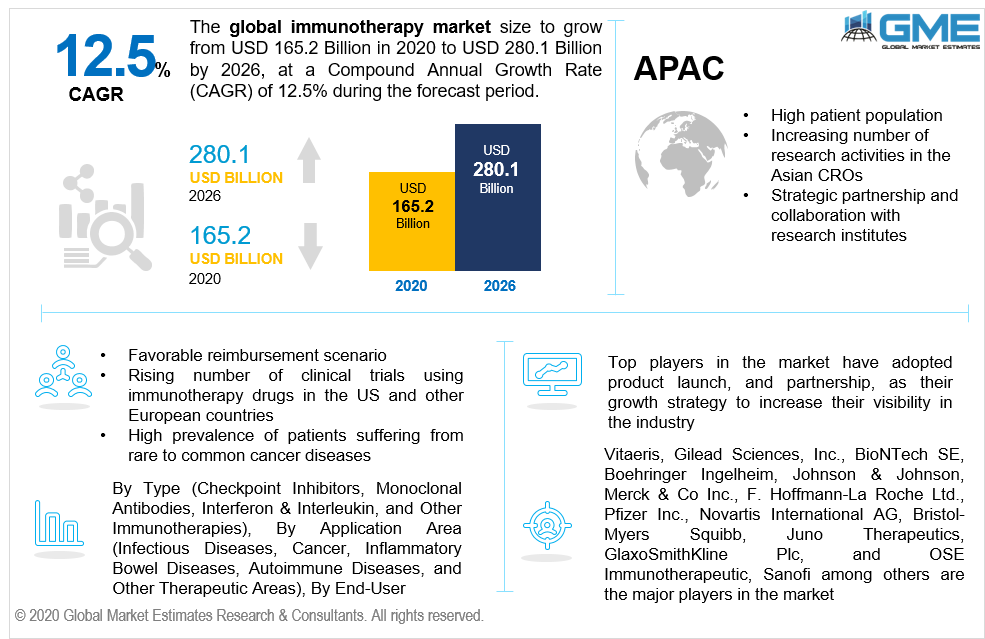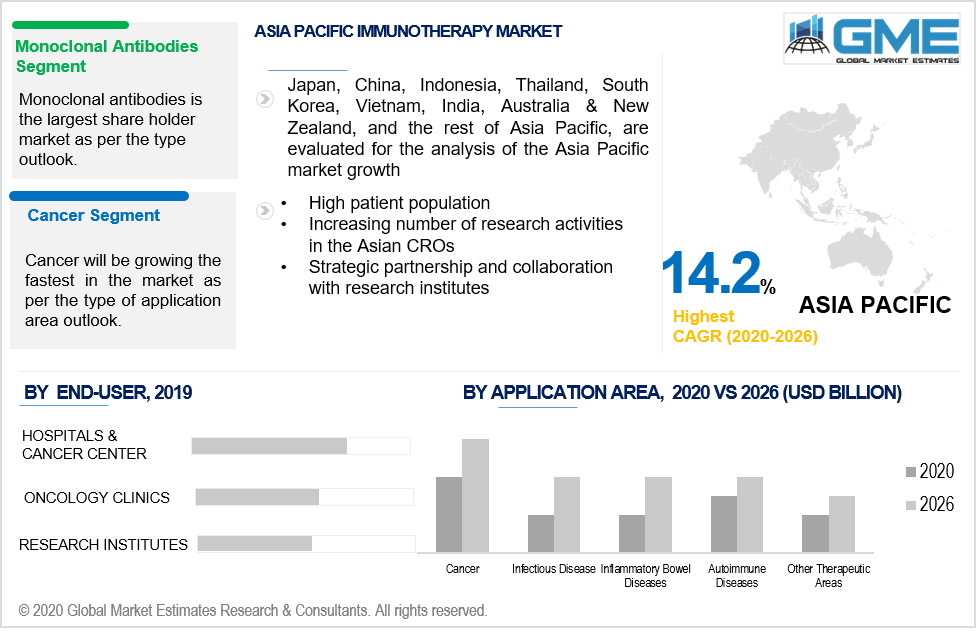
Global Immunotherapy Market Size, Trends & Analysis - Forecasts to 2026 By Type (Checkpoint Inhibitors, Monoclonal Antibodies, Interferon & Interleukin, and Other Immunotherapies), By Application Area (Infectious Diseases, Cancer, Inflammatory Bowel Diseases, Autoimmune Diseases, and Other Therapeutic Areas), By End-User (Hospitals & Cancer Care Centers, Oncology Clinics and Research Institutes), By Region (Europe, North America, MEA, Asia Pacific, and CSA); Vendor Landscape, Company Market Share Analysis, End-User Landscape, and Competitor Analysis
Biological therapy or most famously called immunotherapy is a treatment therapy that initiates the suppression activity of the patient’s immune system. There are two therapies known in the medical fraternity, namely, activation and suppression immunotherapy. The activation type is the methodology that amplifies one’s immune response and treats the disease whereas the suppression type reduces the immune response of the patient for treatment. After the advent of immunotherapy treatment for cancer, doctors have claimed that it could be a promising treatment procedure in the coming years. One such example is the FDA-approved immunotherapy treatment protocol for children and adults with diseases like Hodgkin and non-Hodgkin lymphoma. In simple terms, this methodology is nothing but using a particular part of a patient’s immune system to fight against any kind of disease ranging from cancer to autoimmune disease, an inflammatory disorder, diabetes, and other infectious diseases.
The growth of the immunotherapy market is ought to be on a rise due to the increasing prevalence of cancer disease, autoimmune disease, high demand for biosimilars & monoclonal antibodies for the treatment purpose, the shift of trend for adopting immunotherapy drug treatment from the old and conventional treatment procedures for cancer, and supportive government regulations for clinical trial approval in the field of immunotherapy. However, timely affecting side-effects to the patient and downstream processing complexities related to the manufacturing of immunotherapy drugs will pose a challenge to the market.

Based on the type of immunotherapy available, the market can be segmented into, checkpoint inhibitors, monoclonal antibodies, interferon & interleukin, and other immunotherapies. Owing to the high specificity of monoclonal antibodies as compared to other types and also due to lesser side-effects offered, the segment of monoclonal antibodies will be the largest shareholder in the market in terms of both revenue and volume sales. Also, rising interest in personalized medicines and the increasing incidence of the geriatric patient pool will help the market maintain its high position.
Infectious diseases, cancer, inflammatory bowel diseases, autoimmune diseases, and other therapeutic areas are the types of applications that segment under the immunotherapy market. Due to the high prevalence and incidence of various types of cancer across the globe the market for cancer application is definitely on the rise as compared to other application areas. Moreover, it is estimated that the prevalence of cancer patients will just double in the coming five years, especially in the Asia Pacific region.
Based on potential customers for this treatment protocol, the market can be segmented into, hospitals & cancer care centers, oncology clinics, and research institutes. Hospitals & cancer care centers will account for the largest share of the market owing to increasing spending capabilities of hospitals to host immunotherapy treatment protocol, rising number of cancer admission in hospitals & oncology centers, and services of advanced immunotherapy treatment offered by large-sized hospitals and centers.

The North American region will be the dominant market due to the high presence of patients suffering from rare to common cancer diseases, increasing number of people with some of the other form of autoimmune diseases, rising number of clinical trials using immunotherapy drugs in the US and Canada, and favorable reimbursement scenario witnessed in the US for immunotherapy treatments. However, owing to the huge patient population and the increasing number of research activities in the Asian CROs, the market for the Asia Pacific is ought to be growing the fastest from 2020 to 2026. Also with rising awareness amongst doctors for immunotherapy treatment, the market will foresee a great rise in the coming years.
Vitaeris, Gilead Sciences, Inc., BioNTech SE, Boehringer Ingelheim, Amgen Inc., NBE Therapeutics, Johnson & Johnson, Merck & Co Inc., F. Hoffmann-La Roche Ltd., Pfizer Inc., Novartis International AG, Bristol-Myers Squibb, Juno Therapeutics, Immatics Biotechnologies, Celldex Therapeutics, Bluebird Bio, Teva Pharmaceuticals, AbbVie Inc., AstraZeneca, GlaxoSmithKline Plc, OSE Immunotherapeutic, Sanofi, Genmab A/S, Bayer AG, and Incyte Corporation among others are the major players in the market.
Please note: This is not an exhaustive list of companies profiled in the report.
In December 2020, OSE Immunotherapeutic entered into a research collaboration with the Nantes University for initiating the phase 1 & 2 clinical trials to understand and analyze the advantages and disadvantages of CD28 Antagonist FR104, in patients who will be undergoing kidney transplantation
In November 2020, Kleo Pharmaceutical showcased and presented it studies on proof-of-concept data on KPMW101, which is an anti-tumor therapeutic agent made with a multi-targeted antibody therapy enhancer (MATE) conjugation platform, at the Society for Immunotherapy of Cancer’s (SITC).
We value your investment and offer free customization with every report to fulfil your exact research needs.
The Global Immunotherapy Market has been studied from the year 2017 till 2026. However, the CAGR provided in the report is from the year 2018 to 2026. The research methodology involved three stages: Desk research, Primary research, and Analysis & Output from the entire research process.

The desk research involved a robust background study which meant referring to paid and unpaid databases to understand the market dynamics; mapping contracts from press releases; identifying the key players in the market, studying their product portfolio, competition level, annual reports/SEC filings & investor presentations; and learning the demand and supply side analysis for the Immunotherapy Market.

The primary research activity included telephonic conversations with more than 50 tier 1 industry consultants, distributors, and end-use product manufacturers.

Finally, based on the above thorough research process, an in-depth analysis was carried out considering the following aspects: market attractiveness, current & future market trends, market share analysis, SWOT analysis of the companies and customer analytics.

Tailor made solutions just for you
80% of our clients seek made-to-order reports. How do you want us to tailor yours?
OUR CLIENTS